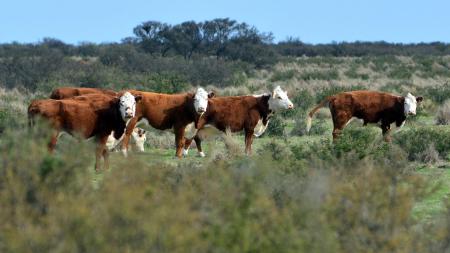The National Agrifood Health and Quality Service (Senasa) certified this week for the first time the export to Chile of four purebred bulls intended for breedingwhich meant a “historic” fact for the organism and Argentina, in the search to expand its genetics in different markets of the world.
The transaction included the sale of four Hereford and Angus breeding cattle, elderly, coming from a cabin located in the town of Trevelin, province of Chubut, bound for the Chilean town of Coyhaique.
“This historic event for our country is based on the sanitary conditions achieved by the Argentine Republic that favor the expansion of its livestock production”highlighted the vice president of Senasa, Rodolfo Acerbi.
He stressed that “in this particular case, the coordination and permanent dialogue of each and every one of the actors that intervened, public and private, was essential for the concretion of the shipment of genetics to Chile,” according to a statement from the agency.
The steps to export the bulls
For her part, in statements to Télam the Director of Foreign Animal Trade of Senasa, Laura Giménezpointed out that “there were more than three years of sanitary negotiations”, since the end of 2018, with the counterpart of Senasa in Chile, the Servicio Agrícola Ganadero (SAG).
He explained that the negotiations dealt with the exchange of import requirements of the importing country (internal regulations, control procedures, among others), which communicates them to the exporter, and the latter evaluates the feasibility of compliance with these sanitary requirements.
In Chile there is a lot of demand and interest on the part of producers to acquire Argentine genetics) A = Laura Giménez, director of Foreign Animal Trade of Senasa (A)
After completing this step, the Senasa member stressed that “Chile accepted the model certificate proposed by Argentina, recognized the Argentine control system as equivalent to that of his country, and this made it possible to start shipping bovine genetics from Patagonia”, which also constitutes a milestone for the producing sector in that region.
Prior to export, the animals were kept in isolation, complying with a quarantine stage, completing all the diagnostic tests required by the Chilean health authorities.
“It is the first export to Chile, country where there is a lot of demand and interest on the part of producers to acquire Argentine genetics; also from the producers of our country to make this exchange of genetics through reproducers”Giménez pointed out.
Operational management was carried out by professionals from the Senasa office in Esquel, supervised by the Animal Health Coordination of the South Patagonia Regional Center, in line with the Senasa Foreign Trade Department, and with the collaboration of the Santa Fe Regional Center and of the General Directorate of Laboratories and Technical Control (DGLyCT).
All the diagnostic determinations required in the export protocol agreed between both countries had the supervision and authorization of the Senasa Laboratory located in the Buenos Aires town of Martínez.
According to data from the Ministry of Agriculture, the FOB amount of the export of live breeding cattle to those neighboring countries ranged from US$ 6,693.91 to US$ 124,383.09; depending on the net weight of the animal and the quantity of exports.
Bovine exports
Currently, Argentina exports cattle for reproductive purposes to Uruguay, Paraguay and Colombia.
Last year “148 cattle were exported, 61 to Paraguay, 67 to Uruguay, and the rest were exported as reproductive material”indicated Giménez, to add that “more than a million export boxes of bovine semen and embryos were also reached to different countries on the five continents, with which we have agreements to export.”
He also added that in 2022 “agreements were reached to export semen to Russia, and semen and embryos to Uzbekistan” and there are “negotiations to export bovine semen to Costa Rica”, while negotiations are underway with other destinations, such as the United States and South Africa. , “where negotiations are more difficult,” Giménez clarified.
Other destinations for these exports are Brazil, Bolivia, Ecuador, Peru, Paraguay (receiving breeding bovines, bovine semen and embryos); Eurasian Economic Union (breeding bovines and bovine semen); China (bovine semen and embryos); Saudi Arabia, Kazakhstan, Morocco, Angola and Nigeria.
With a view to the medium and long term, Giménez was optimistic that this could move forward, since “we have a sanitary negotiation underway to export bovine semen to Chile, that is to say, from the reproductive material, which is the cheapest, easiest way in terms of logistics and more sanitary security”.
Regarding the advantages that genetic export brings to the country, Giménez explained that “it is a growth for the sectors because for breed associations, having Argentine animals and genetics in the world is a global positioning.”
“The export of genetics in itself is already an added value because we export knowledge and breed development; Exporting genetics and being players in the world breed market is already an important achievement for the country because it in turn develops the production of best breeds within our country”, he explained.
Thus, as these operations are carried out in different countries, Argentina “enters the trade, the production of the countries, and this agreement (with Chile) is another step on the path that Argentine bovine genetics is taking in the world to position itself as quality genetics”, concluded the official.








